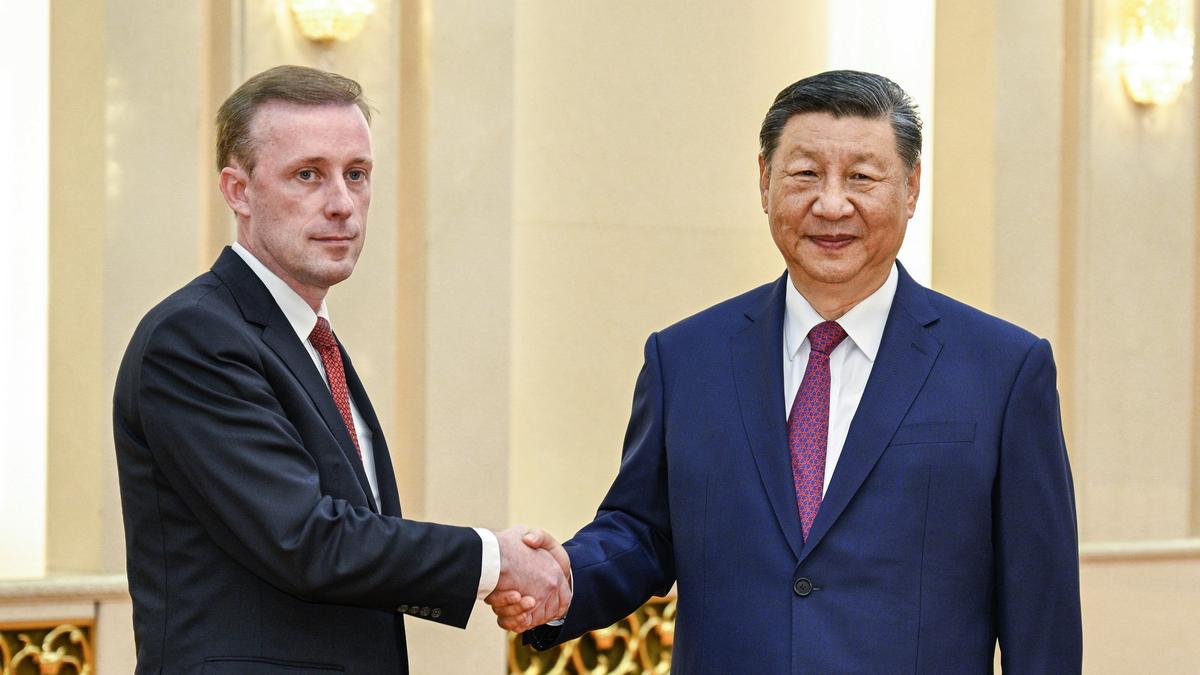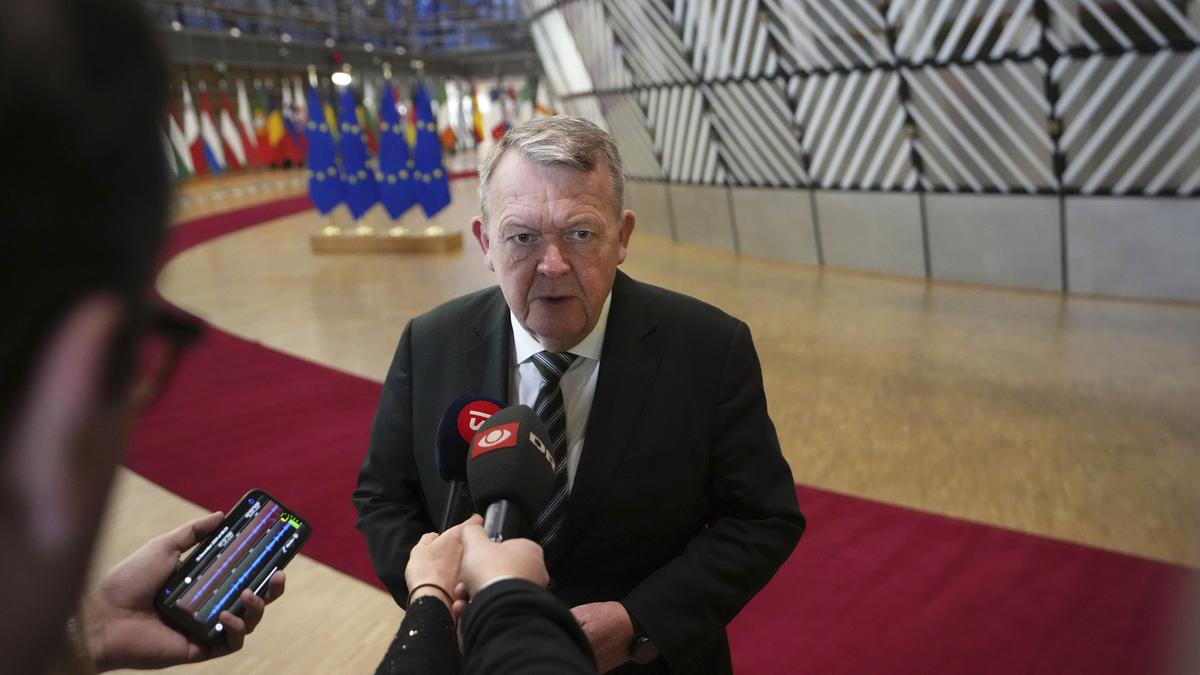Chinese President Xi Jinping met with U.S. National Security Adviser Jake Sullivan on Thursday (August 29, 2024) in Beijing, on a visit with the stated aim of keeping communications open between the two powers, as the relationship between China and the United States has become increasingly tense in recent years.
Mr. Sullivan, on his first trip to China in his capacity as the main adviser to President Joe Biden on U.S. national security issues, has met with senior Chinese officials including Foreign Minister Wang Yi and a senior general of the Central Military Commission.
China and the U.S. have become increasingly at odds over various issues, starting with a trade war dating back to 2018, and which now encompasses global security matters, such as China’s claims over the South China Sea, and industrial policy on things like automobile and solar panel manufacturing.
Also Read: Competition and conflict: On the U.S.-China relationship
Both sides said Thursday (August 29) that they remain committed to managing the relationship. Mr. Xi and Mr. Biden met in San Francisco last November in an effort to improve ties.
“Although the situations of the two countries and China-US relations have changed greatly, China’s goal of being committed to the stable, healthy and sustainable development of China-US relations has not changed,” Mr. Xi said, according to state broadcaster CCTV.
“President Biden is committed to responsibly managing this consequential relationship to ensure that competition does not veer into conflict or confrontation, and to work together where our interests align,” Sullivan said.
Beijing and Washington will also plan for a phone call in the coming weeks between Mr. Xi and Mr. Biden, the White House said on Wednesday. The White House statement said that both sides would keep lines of communication open.
There was no indication that the two leaders might meet in person before Mr. Biden leaves the Oval Office.
The White House said the two sides also planned to hold a military theatre commander phone call in the near future.
China has rapidly expanded its military, and there are concerns that Taiwan and the South China Sea are becoming flashpoints.
Mr. Wang, China’s top diplomat, told Mr. Sullivan that Taiwan’s independence poses the greatest threat to stability in the immediate region. He demanded that the U.S. “stop arming the island but support China’s peaceful unification”, according to a statement released by the Chinese Foreign Ministry.
Taiwan, a self-governing island democracy that split from authoritarian communist China in 1949, has rejected Beijing’s demands that it accept unification with the mainland by peace or by force. The US is obligated under a domestic law to provide the island with sufficient hardware and technology to deter invasion.
The White House statement said Mr. Sullivan “underscored the importance of maintaining peace and stability across the Taiwan Strait”.
Mr. Sullivan planned to meet with China’s vice chairman of the Central Military Commission, Zhang Youxia, on Thursday morning, according to a senior Biden administration official who spoke on the condition of anonymity to discuss the yet to be publicly announced meeting.
Mr. Zhang has spoken in the past of Beijing’s determination to take control of Taiwan. At an international naval gathering earlier this year in northeast China, Zhang said China would strike back with force if its interests came under threat.
He said that China’s territorial sovereignty “brooks no infringement and its core interests cannot be challenged. We do not provoke trouble, but we will never flinch in face of provocation. The Chinese military will resolutely defend the reunification and interest of the motherland”.
Beijing also warned Washington “not to support or indulge the Philippines to infringe” upon China’s rights and interests in the South China Sea. China and the Philippines have clashed over the Second Thomas Shoal, and lately the Sabina Shoal.
The U.S. military has pushed back against China’s claim to virtually the entire South China Sea, saying this week that it would be open to consultations about escorting Philippine ships in the disputed sea amid a spike in hostilities between Beijing and Manila on the issue.
The White House said that Sullivan reaffirmed Washington’s commitment to defending its Indo-Pacific allies and expressed concern about Beijing’s destabilizing actions against “lawful Philippine maritime operations” in the South China Sea.
The Philippines has called for the Association of Southeast Asian Nations to do more. The 10-nation Southeast Asian bloc includes the Philippines, Vietnam, Malaysia and Brunei, which have South China Sea claims that overlap with each other as well as China’s and Taiwan’s.
The U.S. has shifted its policy with China from engagement to competition. The Biden administration has made it a priority to prevent the competition from spiralling out of control while seeking to collaborate with China in areas such as climate change, artificial intelligence and enforcement against illicit drugs.
John Podesta, the senior adviser to the president for international climate policy, will travel to China, and Mr. Sullivan and Mr. Wang discussed “next steps to reduce the flow of illicit synthetic drugs” and “continue repatriation of undocumented migrants”, the White House said.
In July, the U.S. Border Patrol made 1,851 arrests of Chinese immigrants on the border with Mexico, down from the December high of 5,951.
The two sides also agreed to hold a second round of dialogue over artificial intelligence, the Chinese Foreign Ministry said.
Mr. Sullivan raised continued concerns about China’s trade policies and nonmarket economic practices, the White House said.
Mr. Wang demanded that the U.S. “stop suppressing China in the areas of trade, economic and technology”, the Chinese foreign Ministry said.
By resorting to protectionism, the US would only “hurt the global green development and affect the global economic growth”, Mr. Wang told Mr. Sullivan.




